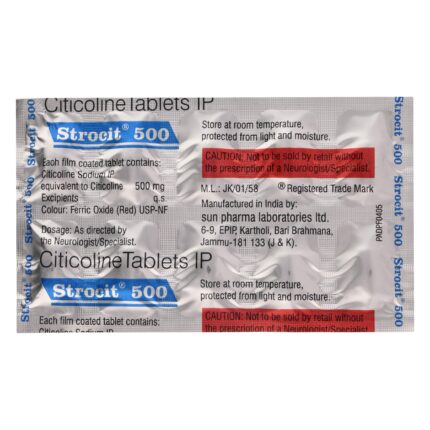Understanding Eutropin 4IU Injection (Somatropin (4IU))
A drug called Eutropin 4IU Injection, which contains Somatropin (4IU), is intended to treat growth hormone deficits in both adults and children. The function of this artificial growth hormone is similar to that of the pituitary gland’s natural growth hormone. It is used to treat a number of disorders in adults, including as growth hormone deficiency, short bowel syndrome, and muscular wasting brought on by HIV/AIDS or other illnesses, as well as to promote growth in children who do not make enough natural growth hormone.
How Eutropin Works
The active component of Eutropin 4IU Injection, somatropin, works by attaching itself to certain receptors on body cells. In doing so, it stimulates the synthesis of insulin-like growth factor 1 (IGF-1) and so fosters growth and development. Consequently, this fosters the development of bones, muscles, and organs. Furthermore, somatropin helps to maintain appropriate amounts of muscle, bone density, and body fat as well as to regulate metabolism.
Indications for Use
The main indication for eutropin 4IU Injection is the therapy of growth hormone insufficiency in both adults and children. When a child’s body produces insufficient amounts of natural growth hormone, it is administered to promote growth and development. It is used to treat problems like growth hormone deficit or muscle wasting brought on by specific medical conditions in adults, as well as to restore growth hormone levels.
Dosage and Administration
The age, weight, and ailment being treated all affect how much Eutropin 4IU Injection is prescribed. Usually, it is injected beneath the skin and delivered subcutaneously. The injection site can change, but the buttocks, belly, and thighs are typical locations. It’s critical to carefully follow the directions provided by the healthcare practitioner and stick to the recommended dosing schedule.
Precautions and Warnings
Prior to initiating Eutropin 4IU Injection treatment, medical professionals should perform a comprehensive assessment to ascertain the suitable dosage and track any possible adverse reactions. Any allergies, current drugs, or pre-existing medical issues should be disclosed to your healthcare professional. Regular monitoring of glucose levels, thyroid function, and growth may also be required during treatment.
Side Effects
Like other drugs, some people may experience side effects with eutropin 4IU Injection. Injection site reactions, such as discomfort, redness, or swelling, are common side effects. Headaches, joint pain, muscular soreness, and fluid retention are a few other potential adverse effects. More severe side effects, like allergic responses, changes in vision, or adjustments to mood or behavior, may occasionally happen. It’s critical to notify your healthcare professional as soon as you notice any strange symptoms or side effects.
Interactions
Certain drugs or chemicals, such as estrogen, anticonvulsants, and corticosteroids, may interact with eutropin 4IU Injection. These combinations could reduce Eutropin’s efficacy or raise the possibility of negative side effects. Before beginning Eutropin treatment, make sure your healthcare provider is aware of all the drugs, supplements, and herbal preparations you take.
Storage and Handling
The manufacturer’s recommendations for storage should be followed when it comes to Eutropin 4IU Injection. Usually, it is kept in the refrigerator between 36°F and 46°F (2°C and 8°C). Let the medication come to room temperature before using. Eutropin should not be frozen or subjected to extreme heat or light. Eutropin should also not be used if the solution is discolored or contains visible particles.
Monitoring and Follow-Up
A physician’s follow-up appointments and routine monitoring are crucial when using Eutropin 4IU Injection for treatment. These consultations enable evaluation of the patient’s growth progress, the efficacy of the medication, and the possibility of complications or adverse effects. Based on each patient’s response and the objectives of their therapy, medical professionals may also modify the dosage schedule.
Long-Term Treatment Considerations
It is crucial to take into account aspects including medication adherence, growth response, and potential long-term impacts on bone health and metabolism for those who need long-term Eutropin 4IU Injection treatment. Healthcare professionals may reevaluate the requirement for ongoing care on a regular basis and change the dosage or mode of therapy as necessary.
Patient Education and Support
The key to a successful Eutropin 4IU Injection treatment plan is patient education and support. Healthcare professionals should give patients comprehensive information about the medicine, including how to take it correctly, any possible side effects, and how crucial it is to follow the prescribed course of action. In order to address any worries or difficulties related to therapy, patients and their caregivers may also find it helpful to use counseling and support services.
Conclusion
Eutropin 4IU Injection, which contains 4IU of somatropin, is an effective drug for treating growth hormone insufficiency in adults and children. Eutropin aids in the stimulation of growth and development, enhancement of metabolism, and management of a number of medical disorders by imitating the action of natural growth hormone. Eutropin should be used under a doctor’s supervision, nevertheless, and users should be informed of any possible interactions and negative effects. For those with growth hormone deficits, eutropin may be a safe and effective therapeutic option when used with the right safety measures and close supervision.












